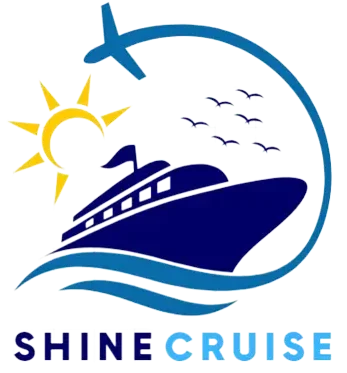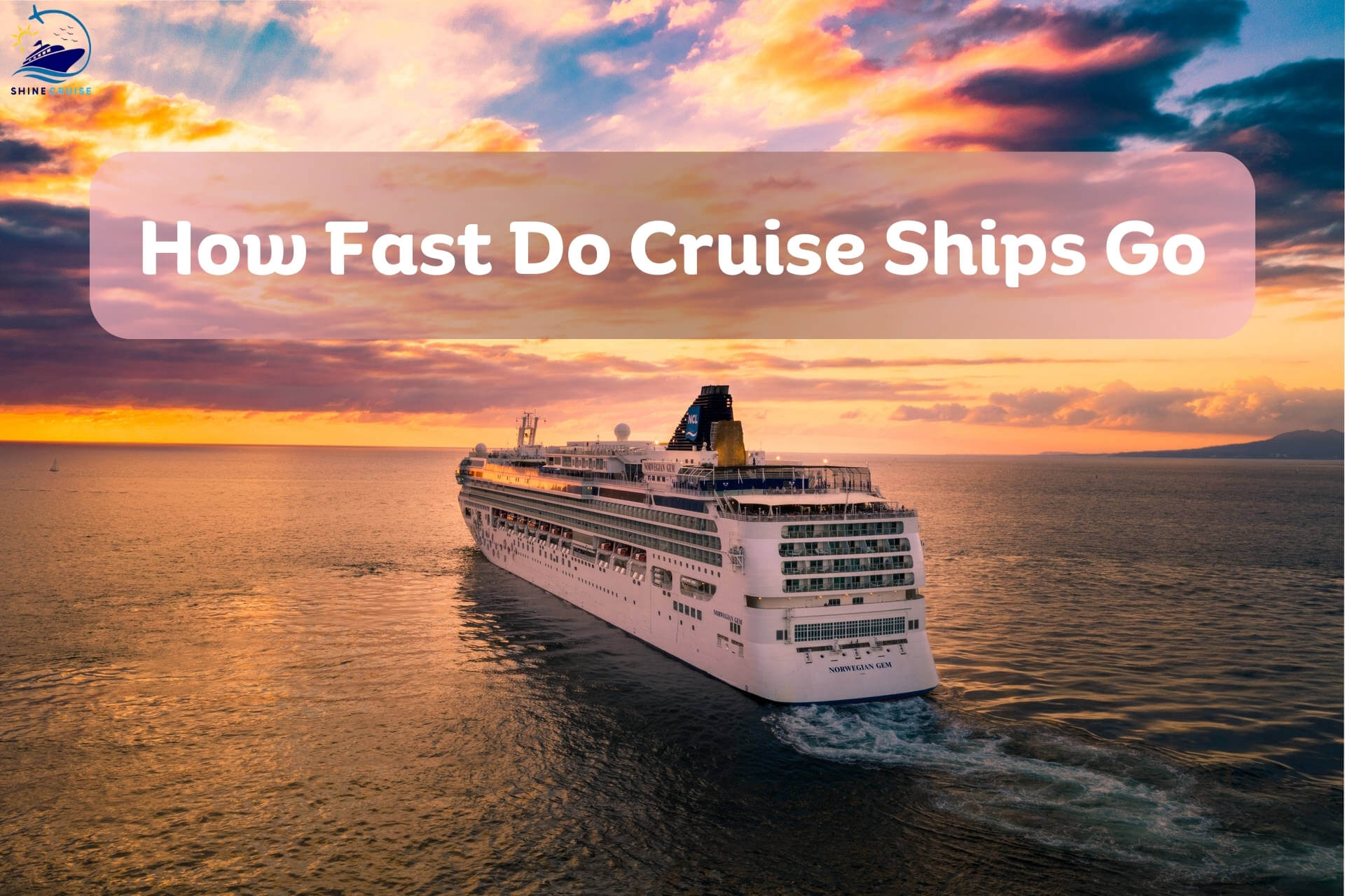Cruise ships are built for smooth and steady travel across the ocean. But have you ever wondered, How fast does a cruise ship go? These massive vessels don’t speed like cars, but their pace depends on factors like size, fuel efficiency, and weather conditions.
On average, most cruise ships sail between 20 to 24 knots (23 to 28 mph). Few cruisers also ask, How far can a cruise ship travel in a day? Some can cover over 500 miles within 24 hours!
Keep reading to explore how fast do cruise ships go and what factors affect their journey.
How Fast Do Cruise Ships Go?
Cruise ships usually travel at an average speed of about 20 knots (equals to 23 miles per hour) and can reach maximum speeds of about 30 knots (34.5 miles per hour). The maximum speed of a cruise ship is about three knots higher than its average cruising speed. For instance, the fastest cruise ship, Cunard’s Queen Mary 2, can reach speeds of up to 30 knots.
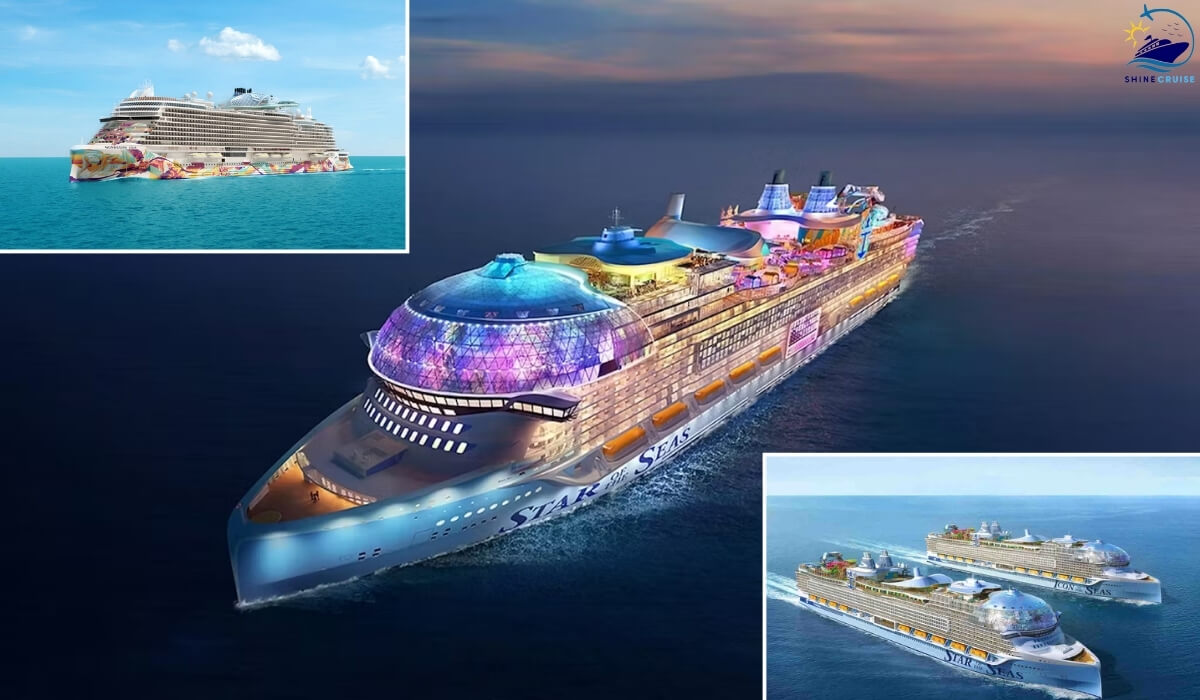
The cruise ship travels at the speed which is necessary to reach the next port by morning. Cruise ships rarely use their top speed, especially for itineraries with close ports. The average cruising speed of a ship is often much lower.
A Cruise Ship can travel 400 to 500 nautical miles in a day, which is about the same as 460 to 575 miles on land, but it depends on the speed and route of cruise ship.
Cruise Speed (Knots) & Distance (Nautical Miles)
Nautical mile is the standard unit used to measure the distance a cruise ship travel. One nautical mile is equal to 1.15 land miles or 1.852 km/h.
The speed of the ship is measured in a unit called knots and knot means one nautical mile per hour. 1 knot is equals to 1.151 miles per hour. If a ship travels at an average of 20 knots from Fort Lauderdale to St. Maarten, it’s moving at about 23 land miles per hour.
Note: Nautical miles measure distance and knot measure speed.
Knots to MPH (Miles Per Hour) Conversion
The Cruise Ship speed in knots can be converted into miles per hour by simply multiplying the knots by 1.151.
Average & Maximum Cruise Speed
The Maximum speed for most cruise ships is between 25 to 30 knots which is about 35 miles per hour. The Queen Mary 2, a transatlantic ship by Cunard, is the fastest passenger ocean liner today, reaching a top speed of 30 knots.
Most of the modern cruise ships travel at an average speed of 20 to 25 knots (23 to 29 mph), with some capable of reaching 30 knots (35 mph).
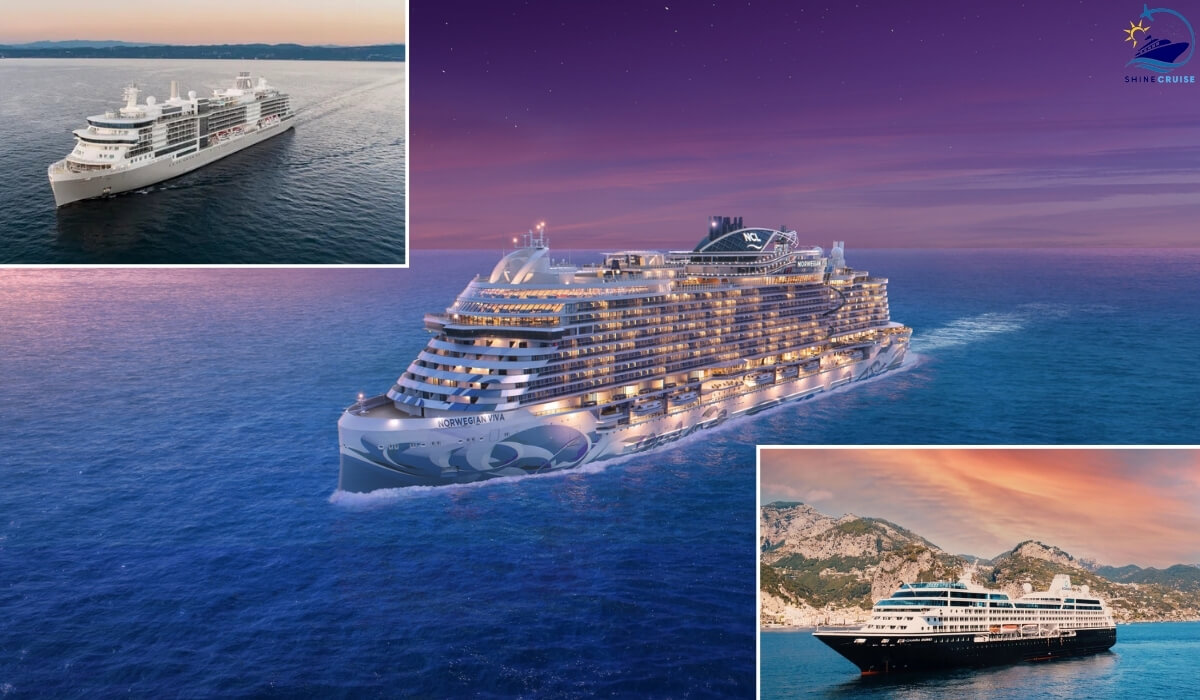
The cruising speed of ships is much lower than its maximum speed. This is because cruises at higher speeds consume more fuel. So cruising speed is kept low to save fuel and protect the environment. New cruise ships now use LNG fuel, cutting carbon emissions by about 30%. This is a top choice for reducing cruise ships’ carbon footprint.
Cruise ships can go faster and slower in certain situations. Modern cruise ships can sail fast to avoid storms and may need to go slower in rough waters for safety.
Which Cruise Line has the Fastest Cruise Ship Speed Record?
When picking a cruise ship, you have lots of choices. Each cruise line has its own style, from big ships to smaller ones. They all offer different experiences.
Here are the fastest ships of different cruise line:
Cunard Line: Cunard Line’s Queen Mary 2 is the fastest passenger ocean liner today and can reach a speed of 30 knots which is equivalent to 34.5 miles per hour.
Royal Caribbean: Royal Caribbean is one of the world’s biggest cruise lines with 27 ships. Their latest edition, Icon of the Seas, can travel at a maximum speed of 23 knots per hour, equivalent to about 26.45 mph.
Norwegian Cruise Line: Norwegian Star is the fastest member in NCL fleet with maximum cruising speed of 25 knots equivalent to 29 mph
Carnival Cruise Line: The Carnival Cruise Line larger and newer ship, the Carnival Jubilee can reach speeds of up to23 knots per hour, which is approximately 27 miles per hour.
Disney Cruise Line: Disney Wish has cruising speed of 19.5 knots and maximum speed is 23 knots
Key Factors Affecting Cruise Ship Speed
The speed at which cruise ships navigate through open waters is referred to as their cruising speed or service speed. Some key factors that affect cruise speed and how far a cruise ship can travel in a day:
Schedule: Cruise ships adjust their speed based on the time available to reach the next port with slower speeds when there is plenty of time.
Fuel Efficiency: Slower speeds are favored for fuel conservation, so ships will decrease speed when necessary to conserve fuel.
Safety Measures: In certain regions like Alaska, cruise ships exercise additional caution to avoid glaciers and other hazards.
Diesel engines: Cruise ships mostly use diesel engines, which are efficient and reliable, leading to better fuel consumption. New cruise ships now use LNG fuel to save fuel and protect the environment.
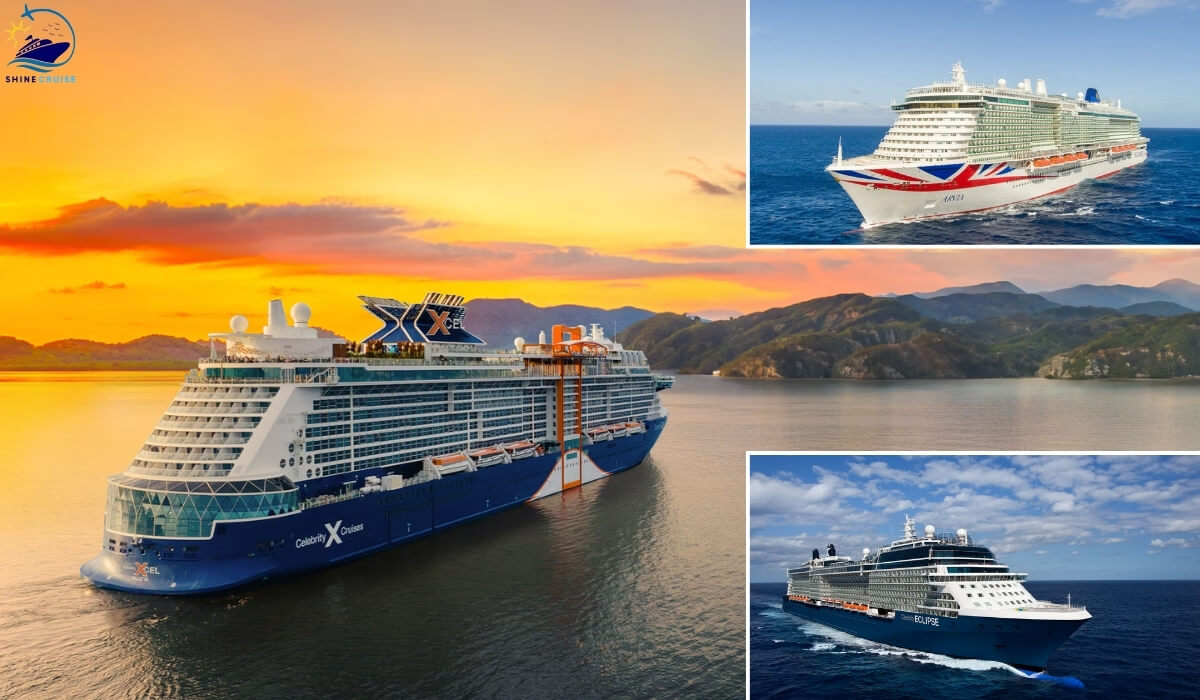
Cruising Speed: The Cruise Ships cruise at an average speed of 20 to 25 knots under normal conditions. The Cruise Ship speed depends on various factors such as weather, size of ship etc.
Weather conditions: Ocean conditions like waves, currents, and wind can affect a cruise ship’s speed, causing the ships to slow down in rough seas for stability and passenger safety. Cruise ships may increase speed to avoid storms and slowdown in rough weather, prioritizing progress over calm seas.
Modern Ships: Modern Cruise Ships use LNG fuel, which reduces carbon emissions by about 30%. This is the best way to lower cruise ships’ carbon footprint.
Cruise ship’s size: A ship’s size can impact its daily travel distance, as larger ships necessitate more power to travel through water, potentially limiting their speed and range.
Proximity to Ports: Cruise ships reduce speed as they near ports and may even anchor at sea if they arrive ahead of schedule.
How Far Can a Cruise Ship Travel in a Day?
The distance a cruise ship can cover within a day is influenced by several factors such as the ship’s size, planned route, speed, fuel economy, and weather conditions. A cruise ship can travel 480 nautical miles equivalent to 552 land miles in 24 hours at its standard speed.
From the UK: A cruise ship setting sail from Southampton on England’s southern coast could travel as far as Newcastle Upon Tyne in the Northeast of England within 24 hours.
From Florida: A cruise ship leaving Port Canaveral, Florida, could reach Havana, Cuba within 24 hours.
From Spain: A cruise ship departing from Barcelona, Spain, could reach Livorno (Pisa), Italy within 24 hours.
Cruise ships plan their trips to arrive at ports in the morning and leave in the evening so passengers can explore. If the distance between ports is too far, the ship will spend a day at sea. Keep in mind that these are just made-up trips.
Does Cruise Ship Ever Speed Up?
Cruise ships don’t always move at the same speed. They can go faster when needed. If strong winds slow them down, they may speed up to stay on schedule. In rough waters or storms, captains increase speed to pass through quickly. Sometimes, a ship rushes to port for a medical emergency. To avoid bad weather, captains may speed up before a storm arrives.
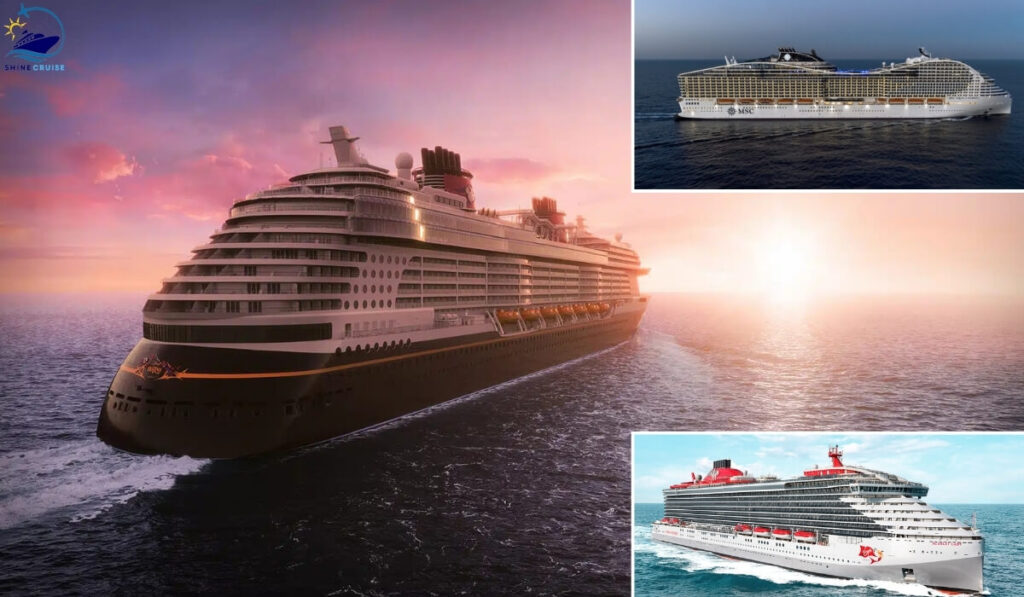
At night, ships might go faster so passengers enjoy a smoother ride during the day. But going too fast burns extra fuel, increasing costs and pollution. Cruise ships always balance speed with safety and comfort.
Which is the Fastest Cruise Ship?
Cunard is known for building some of the fastest ocean liners in history. One of their most famous ships, Queen Elizabeth 2, was launched in 1969. She was built for speed with a service speed of 28.5 knots (53 km/h) and a top speed of 32 knots. This made her one of the fastest passenger ships of her time.
In 2004, Cunard introduced the Queen Mary 2, which became the company’s new flagship. This ship is slightly slower than the Queen Elizabeth 2, but still one of the fastest ocean liners today. The Queen Mary 2 cruises at 26 knots (48 km/h) and can reach just over 30 knots (56 km/h). She was built for long ocean voyages, offering speed and comfort for passengers traveling across the Atlantic.
Even though the Queen Mary 2 is sometimes called the fastest cruise ship, she is actually an ocean liner. Cruise ships focus on luxury and travel slowly for passenger comfort. Cunard’s legacy proves that speed and elegance can go together, making transatlantic voyages faster and smoother.
FAQs – How Fast Do Cruise Ships Go?
What is the Reason for the Increased Speed of Modern Ships?
Modern ships have better technology, like air bubble systems under the hull. Which reduces friction between the ship and the water, so they can go faster using the same fuel, or they can use less fuel to go the same speed.
How is the Top Speed of a Cruise Measured?
Cruise lines always calculate an average speed that considers both with and against the waves instead of waiting for specific sea conditions to record speed. This method provides a more accurate way to measure the top speed.
Which is the Fastest Ocean Liner on Record?
The SS United States was the fastest ocean liner ever built. On its first trip in 1952, it broke the trans-Atlantic speed record and reached a top speed of 39 knots (45 mph).
Is There Any Speed Limit for Cruise Ships?
Ships can go fast, with maximum speed reaching up to 30 knots which is equivalent to 34.5 MPH.
How Fast does a Cruise Ship Go at Night?
Cruise ships travel at the same speed at night as they do during the day, usually going 18 to 22 knots (20 to 25 MPH). Some ships can go up to 30 knots (35 MPH).
- Best Time to Book a Cruise for the Best Deal - February 10, 2026
- How Fast Do Cruise Ships Go? Cruise Speed Facts - February 10, 2026
- What is the Lido Deck on a Cruise Ship? Complete Guide - February 10, 2026
